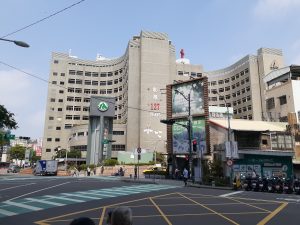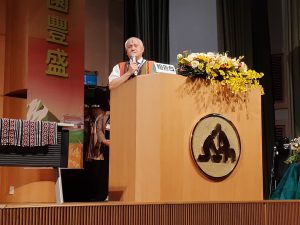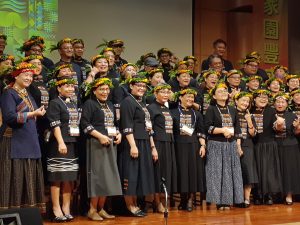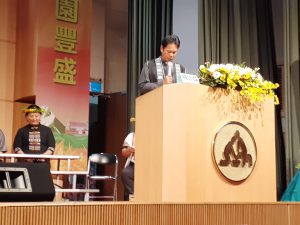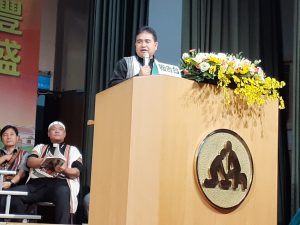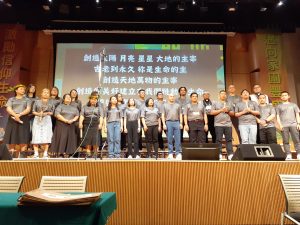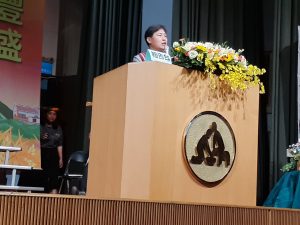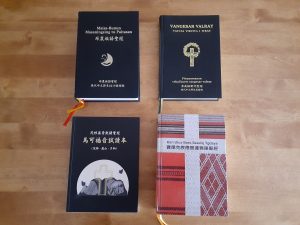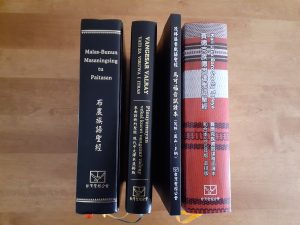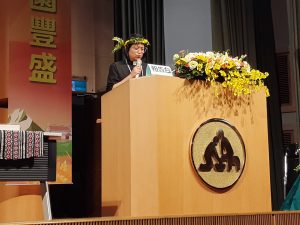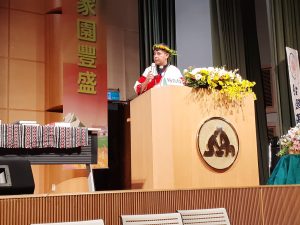On April 17 (2024), I journeyed from Taipei to Changhua, a large city in the middle of Taiwan, where I attended one day of the Presbyterian Church in Taiwan’s 69th General Assembly. The GA was making time for two special celebrations.
First was a thanksgiving worship service to celebrate the 70th anniversary of the PCT’s Indigenous Mission Committee (IMC). Rev. Sudu Tada, Associate General Secretary of the PCT responsible for many indigenous mission activities, welcomed everyone and gave some brief background on the IMC. It was established as a result of the vision of PCC missionary Rev. James Dickson and leaders in the PCT to meet the needs and to expand mission efforts among the growing indigenous churches. Today there are over 500 indigenous congregations in the PCT. On any Sunday, people are worshipping God in 10 or more different indigenous languages.
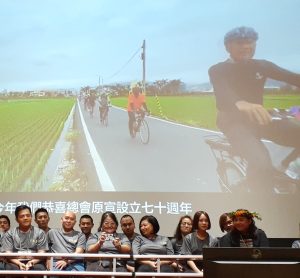
Video of young people cycling to celebrate the 70th anniversary of the PCT’s Indigenous Mission Committee (April 17, 2024)
The service was led by ministers currently on the IMC who come from various ethnic groups: Paiwan, Sediq, Tao and Tayal. Hymns and prayers of thanksgiving were offered to God using Mandarin-Chinese as a common language. A dynamic video of young people was shown with scenes from various celebratory activities held this year around the island, including visits by motorcycle, bicycle or on foot to traditional ancestral lands, parks and indigenous churches.
The Paiwan Presbytery Pastors’ Choir sang an inspiring song, “Mountains and Seas Sing with Joy.” You can see and hear them at: [ https://fb.watch/rDE7cvnx2X/? ].
The Bible reading in Tao (spoken on Orchid Island) and Mandarin was taken from Isaiah 52:7,
“How beautiful on the mountains are the feet of those who bring good news,
who proclaim peace, who bring good tidings, who proclaim salvation.”
In his sermon, “Indigenous Mission Opportunities”, Sediq pastor Rev. Pedo Ukan noted how from its beginnings over 70 years ago, indigenous mission in Taiwan has aimed at identifying in solidarity with each people group, incarnating the Gospel of Jesus Christ, building strong churches, mutual prayer and support, plus building good relationships with (non-indigenous) churches on the plains. He pointed out some of the challenges faced by indigenous churches and communities: loss of ancestral land; loss of one’s own indigenous language and culture, because students typically must leave their villages for middle school, high school and university, where they learn more Mandarin, then English; loss of gifted middle-aged people who migrate to cities for work and better paying jobs; mountain and rural villages where grandparents live alone or care for their grandchildren, while parents return on weekends or holidays. Mountain and rural churches were once vibrant, multi-generational gathering places, strong in the Christian faith and their own language; but now these churches have become weaker due to migration to the cities. Some are without a full-time pastor. The IMC has programs to plant and support indigenous churches in the cities, but more needs to be done to help students and families retain their faith, language and culture. Isaiah 52:7 applies not only to those whose feet are still in the mountains, but to those who bring good news to indigenous people in the cities too. Rev. Pedo also emphasized the sovereignty of God, the covenant love of God, the steadfast love and faithfulness of the LORD. Because God is with us, the IMC and all the PCT’s indigenous churches can go forward in mission to evangelize and to live the Christian life. The IMC is grateful for the support of the PCT’s GA and (non-indigenous) plains churches too.
An indigenous youth choir from several churches and accompanied by guitar, drums and nose-flute, sang a beautiful song entitled, “The Prayer of Indigenous Youth”. They praised God for his glorious creation and for sending Jesus to die on the cross. They prayed for God to fill their lives with his compassion and peace and to help them carry their crosses and make them signs of hope and new life for other indigenous young people.
One of the IMC’s mission secretaries, Tayal minister Rev. Omi Wilang, shared some thanksgivings and future prospects. He reminded us that Taiwan, Formosa, is a beautiful island, a sign of God’s good creation. It has been the home of indigenous peoples for thousands of years. Once there were over 60 different indigenous groups in Taiwan; now only 16 are recognized by the government. The others have died out or been assimilated into the dominant Han-Chinese culture. In the early 1600s Dutch missionaries made contact with plains aboriginal people like the Siraya who lived near the city of Tainan. They even translated the Gospels of Matthew and John into the Siraya language! But in the mid-1600s Han people from China drove out the Dutch and the gospel message withered away. Rev. Omi stated that in the Han-Chinese era before 1895, and during the Japanese era 1895-1945, these “newcomers to our island homeland” referred to indigenous peoples as “raw savages” then, as they became more assimilated, “cooked savages”. Since the KMT government arrived in the late 1940s until now, there have been more name changes: from “mountain people” to “aboriginal people” to “our aboriginal tung-pau (out of the same womb!)”, and finally to the name we ourselves prefer, “indigenous people(s)”.
Rev. Omi went on to say, the PCT is grateful for pioneering Canadian Presbyterian missionary George Leslie Mackay and others who shared the good news of Jesus and modern medicine in holistic mission which aimed to care for the whole person in the whole village. The PCT has contributed to the dynamic growth of indigenous churches from their beginnings in the early 1900s to over 500 congregations today. All of us are creatures of God, who live on God’s land, in relationship with God’s creation (flora and fauna), and who bear witness to the living God. Rev. Omi encouraged us to look for new opportunities. Next year, 2025, the PCT will celebrate 160 years since British missionaries began the modern era of mission work. What new mission projects can the IMC and local indigenous churches begin and support? How can we get people to read their new Bibles and use their ancestral languages? Let us pray, seek God’s will, and work together both in diversity and in unity.
A second worship service was held in the afternoon to celebrate and recognize the publication of indigenous Bibles over the past year: the complete Bunun Bible (March 2024), the Pinuyumayan New Testament (November 2023), the Gospel of Mark in three Ngudradrekai dialects (Maolin, Tona, Wanshan, October 2023), and the complete Bible in the Seediq-Tgdaya dialect (September 2020). (The last Bible had not yet been recognized publicly by the GA due to Covid.) I had the joy and honour of being the BST’s Translation Advisor for all but the last Bible.
The celebration service was led by ministers from each of these ethnic groups. We began praising God using the words of a Pinuyumayan hymn. Opening prayer was led by the General Secretary of the PCT, Rev. Chen Hsin-liang. For many years he served as the pastor of a church in Changhua which was composed largely of indigenous peoples from all over Taiwan who had migrated to the city to work at Changhua Christian Hospital.
The scripture lesson was taken from 2 Timothy 3:16-17. It was read beautifully in Pinuyumayan by Rev. Salrebi Balrangatu. She is now the lead typist on our team as we translate Psalms and Proverbs. Her father was a much-loved Pinuyumayan pastor who began work on the translation of the NT before he died–too young–of an illness. The father’s mantle has been passed on to his daughter. When I thought of all the hard work the team had done to translate the NT, and our beloved 84-year-old lead translator, Rev. Chang A-sin, then heard Rev. Salrebi read so clearly in Pinuyumayan and with such feeling, it brought tears to my eyes.
A short sermon, “The Bible, God’s Word”, was preached by Rev. Lihang Rabug, Assistant Moderator of the Sediq Church District (not yet large enough to form a presbytery). He spoke for all of us when he thanked the PCT’s General Assembly and the Bible Society in Taiwan (BST) for their vision and action over 70 years translating the Bible into the indigenous languages spoken in Taiwan. He acknowledged the hard work and dedication of all the translation teams. By the grace of God, they have overcome many challenges: recovering their ancestral languages through the act of translating; funding each project which took years to complete; overcoming obstacles to meet in person; translating from Hebrew and Greek, with the help of Mandarin-Chinese versions, clearly and accurately into one’s own mother tongue.
When Rev. Lihang quoted scripture in his Seediq-Tgdaya language, I was again moved to tears. He shared with us that because he is a younger pastor in his 40’s, when writing his sermons and preparing to lead Sunday worship services in his local church, he has always had to ask one of his elders to translate the Bible readings for him. But now he can read and prepare directly from his own Seediq-Tgdaya Bible. The new Bible is helping him learn more words and how to say things in his ancestral language. His elders love to help him practice reading the Bible out loud. They smile when they see him improving and reading more clearly and accurately. He is an example of what can be done to help preserve and promote one’s indigenous language. The Bible can help middle-aged pastors or young children identify with new-found self-esteem with their God-given ancestral language and culture. As I listened to the sermon, I could visualize the faces of my many coworkers who have and continue to work hard for moments like this, to hear younger pastors recapturing their ancestral languages and using them to teach and preach the Good News of Jesus. God’s Word is a precious life-giving Word.
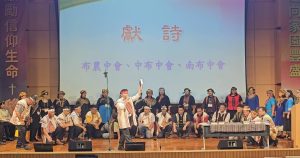
Ministers from the three Bunun Presbyteries thank Tamadaza for their new Bunun Bible (April 17, 2024)
After the sermon, over 30 male and female ministers from the three Bunun presbyteries, dressed in their traditional outfits and head-wear, sang out powerfully as leaders took turns lifting up their new Bunun Bible thanking and glorifying “Tamadaza (God)”. You can see their dramatic presentation in the video below:
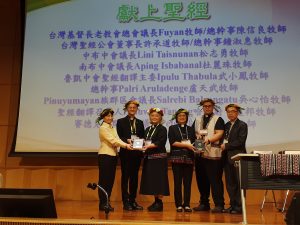
Pinuyumayan pastors present their first-ever complete New Testament to the BST (2 on left) and PCT (2 on right). (April 17, 2024)
In a sign of gratitude, representatives from the Bunun and Ngudradrekai Presbyteries and the Pinuyumayan and Sediq Church Districts, dressed in traditional attire, presented a copy of their new Bibles to the Moderator and General Secretary of the PCT and to the Board Chair and the General Secretary of the BST.
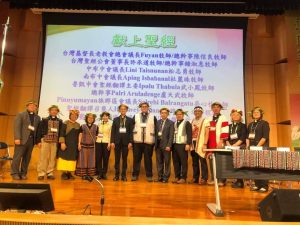
Bunun, Ngudradrekai, Pinuyumayan and Sediq reps presented their new Bibles to reps from the BST and PCT. (April 17, 2024)
The whole assembly then stood and joined in the following Offertory Prayer (read in Mandarin as a common language):
“O LORD, who by your word created the heavens and the earth, we thank you for your words, which renew our lives, grant us wisdom, enlighten our hearts and minds, and enable us to walk in right ways. Today we are gathered here to present the Bunun, Ngudradrekai, Pinuyumayan and Seediq Bibles. Thank you, LORD, for leading the Presbyterian Church in Taiwan and the Bible Society in Taiwan together to complete this work. LORD, may you accept our offering. All glory to you, O LORD. Amen.”
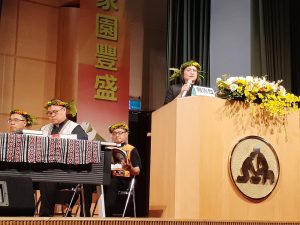
Rev. Salrebi Balrangatu shares how much the Pinuyumayan New Testament means to her and her church. (April 17, 2024)
Pinuyumayan Rev. Salrebi Balrangatu shared more words of thanksgiving on behalf of one of the Bible translation teams. She shared some personal stories and told us how much the newly translated New Testament means to her and her congregation. (For more about the Pinuyumayan NT, you can see my previous blog report at: https://pccweb.ca/missionblog/2023/11/27/the-pinuyumayan-new-testament-and-65th-anniversary-of-christian-mission-nov-26-2023/ )
This deeply meaningful service closed with the benediction spoken in ‘Amis by the Moderator of the PCT’s GA, Rev. Fuyan Suda. I smiled to think that he is the son of Rev. Suda with whom I was working one week before on our revision of the ‘Amis Old Testament.
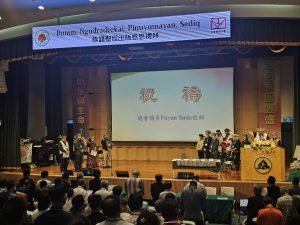
Moderator of the PCT’s General Assembly, Rev. Fuyan Suda prays a benediction in ‘Amis. (April 17, 2024)
We look forward to future PCT General Assemblies when Bibles we are currently translating can be presented as our offerings to God and gifts to Taiwan’s indigenous churches, Bibles in: (Revised) ‘Amis, Cou, Paiwan, Pinuyumayan (Psalms and Proverbs), Sediq-Toda and Tao. Thanks for your prayers and support.
May God be gracious and make it possible for celebrations like these to be held one day among 1st Nations churches in Canada.


